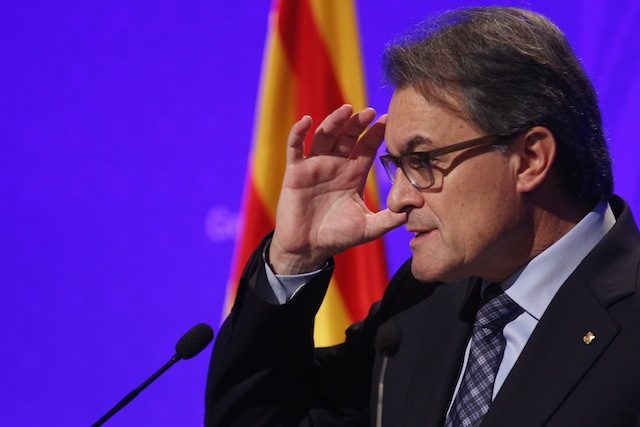SUMMARY
This is AI generated summarization, which may have errors. For context, always refer to the full article.

BARCELONA, Spain – The head of the regional Catalan government, Artur Mas, said Tuesday, November 25, he wants to hold early elections in the wealthy region centered in independence from the rest of Spain.
The election, which would involve a joint list of candidates from all parties that favor independence, is the “only” way to allow Catalans to voice their opinion after a symbolic independence referendum held on November 9 that was opposed by the central government, he added.
The elections would be part of a 6-step process which would be completed before the end of 2016 aimed at creating an independent state which Mas unveiled during a speech in Barcelona on Catalonia’s future after the referendum.
“The moment has come to use the only tool that we have left to be able to hold the consultation,” he said before an audience of 3,000 people who frequently applauded.
“Having gotten so far it would not be understandable that we now stopped on the path we have begun. We need to know with precision if there is a clear majority in Catalonia to have a state or not.”
The Catalan leader did not set a date for the early elections in the northeastern region. Elections are not due in Catalonia before 2016.
If the joint list wins an absolute majority, the regional government that emerges would then inform Spain and the international community of “the intent to form a state in Catalonia,” Mas said.
The government would then open talk on the terms of separation, prepare the structures of a new state and a “future Catalan constitution,” he added.
Once this process is concluded, fresh elections would be called in Catalonia as well as a referendum to ratify the desire for independence on the part of Catalans, Mas added.
“The final decision belongs to the Catalan people, it has to be a direct decision and it can’t be (decided) in offices,” he said.
Majority want constitutional reform
Spanish public prosecutors on Friday, November 21, filed suits against Mas and two other senior members of the Catalan government for going ahead with the symbolic independence referendum despite it being ordered suspended by Spain’s constitutional court.
The Catalan government says 2.3 million people took part in the ballot, which was organized by volunteers. That was more than a third of all eligible voters in the region.
Roughly 80% of those who took part in the symbolic vote said they wanted Catalonia to be an independent state. However the majority of anti-independence voters stayed at home.
Catalonia held the poll after plans to stage an official non-binding referendum were also suspended when the Spanish government challenged its legality.
Mas has hailed the ballot as a “total success”. But Spain’s conservative Prime Minister Mariano Rajoy dismissed it as a “deep failure” since “two out of three Catalans paid no attention”.
Rajoy argues that holding an official referendum would be “impossible” because under Spain’s constitution only the central government can call such votes.
Demands for independence in Catalonia, which accounts for about a fifth of Spain’s population and economic output, have grown over recent years, fanned by the country’s economic crisis.
Catalans complain that their region does not receive investments in proportion to the taxes it pays and that the central government meddles in its linguistic and education policy.
A majority of Catalans, 60.3%, want a reform of Spain’s constitution to create a federal state to resolve the conflict, a poll published Tuesday in center-right daily newspaper El Mundo showed.
Rajoy, who has been criticized by the left, will visit Barcelona on Saturday, November 29, in his first visit to Catalonia since the symbolic independence referendum.
“I have to explain my reasons better” to Catalans,” he said when the trip was announced earlier this month. – Rappler.com
Add a comment
How does this make you feel?
There are no comments yet. Add your comment to start the conversation.